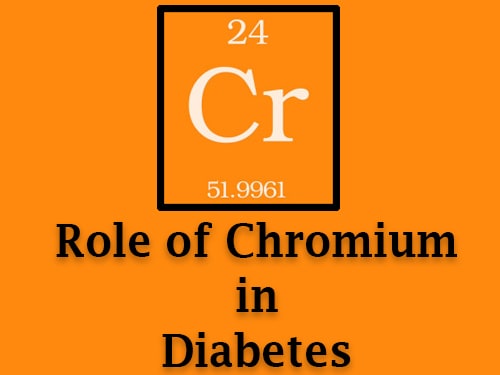
Chromium is an essential mineral—just to clarify, chrome metal is made by electroplating a very thin layer of the mineral chromium onto metal or plastic—and while chrome may be useful for your car’s bumper, it is not useful for your overall health!
Chromium appears to be necessary for the optimal function of insulin. There is a relationship between being low in chromium and an increased risk for diabetes and high blood sugar—and an increased risk for high triglyceride levels, heart disease, and high cholesterol levels.[1] Many people are low in this essential mineral—particularly the elderly, those who are physically very active, pregnant women AND those people who consume high levels of sugar and sugar-filled foods.
Chromium: The Basics
Chromium (Cr) in the body is generally in its trivalent form, or Cr3+. Cr3+ is thought to act as a cofactor for a protein known as chromodulin. Chromodulin is believed to enhance the signaling activity of insulin after insulin binds to the cells of the body. The enhanced signaling activity of insulin would result in increased uptake of blood sugar by cells, thus decreasing the level of sugar in the blood.[2]
There are a lot of “unknowns” regarding chromium, but it is believed that men over the age of 14 are adequately supplied (Adequate Intake) with about 35 mcg/day while women over the age of 14 are adequately supplied with a bit less—about 24 mcg/day.
Higher amounts of chromium are needed in pregnancy (29 mcg/day) and breastfeeding (44 mcg/day), but it is not known if gestational diabetes is related to low chromium levels during pregnancy. Adults over the age of 50 require about 30mcg/day while children require lower amounts based on their age. There is another form of chromium—the hexavalent form, or Cr6+. This form of chromium is dangerous and a known carcinogen.[3]
I recommend reading the following articles:
Chromium and Diabetes
The studies done on the relationship of chromium supplements or chromium levels have not been entirely clear cut, but most studies have indicated that adding chromium to the diet does not significantly affect blood sugar levels in non-diabetic individuals.2
The most recent strong evidence from a meta-analysis of seven randomized, placebo-controlled studies (RPCTs, the current gold standard type of study) indicated that taking 250mcg a day had a significant effect on lowering blood sugar levels but had no effect on A1c.
Another meta-analysis of nine RPCTs did NOT find that 200-1000 mcg/day of chromium was effective in either reducing blood sugar levels or the A1c percentage.2
Other studies looked at a particular form of chromium—chromium picolinate—these studies found that chromium picolinate plus biotin (a B-vitamin) DID lower blood glucose levels and A1c percentages. Some studies have also indicated that taking chromium during pregnancy may help control blood sugar levels.
Overall, the studies have not provided very strong evidence for specific chromium supplementation, but do indicate that adequate levels of chromium are important. There is weak evidence that chromium may help improve insulin sensitivity in individuals at risk for diabetes
Chromium is supplied in most multivitamin and mineral supplements. Chromium is also found in broccoli, green beans, grape juice, foods made of whole grains, poultry, lean beef and orange juice.
At this point, until more and larger studies are completed, getting chromium from the sorts of foods generally recommended for diabetes as well as a daily multivitamin/multimineral supplement seems to be the most reasonable course of action.
If you decide to take Chromium as a separate supplement, consider adding B-complex vitamins—one of the strongest studies indicated that B-complex vitamins such as biotin may function to increase the effects of chromium.
For additional informational check these out:
Safety Questions
Chromium picolinate at 1000mcg/day seems to be safe for at least several months.2 If you decide to supplement, it is best to stick with chromium picolinate and to ensure that whatever supplement you purchase it has gone through independent lab testing—this is important because of the possibility of contamination with hexavalent chromium—a known carcinogen.
Independent lab testing can pick up this sort of contamination, but testing is voluntary. As a general rule, only buy supplements from companies that have their product tested. There have been rare serious adverse effects including kidney and liver damage.2 Talk to your physician and pharmacist for the best advice on dosing.
TheDiabetesCouncil Article | Reviewed by Dr. Sergii Vasyliuk MD on June 02, 2020





